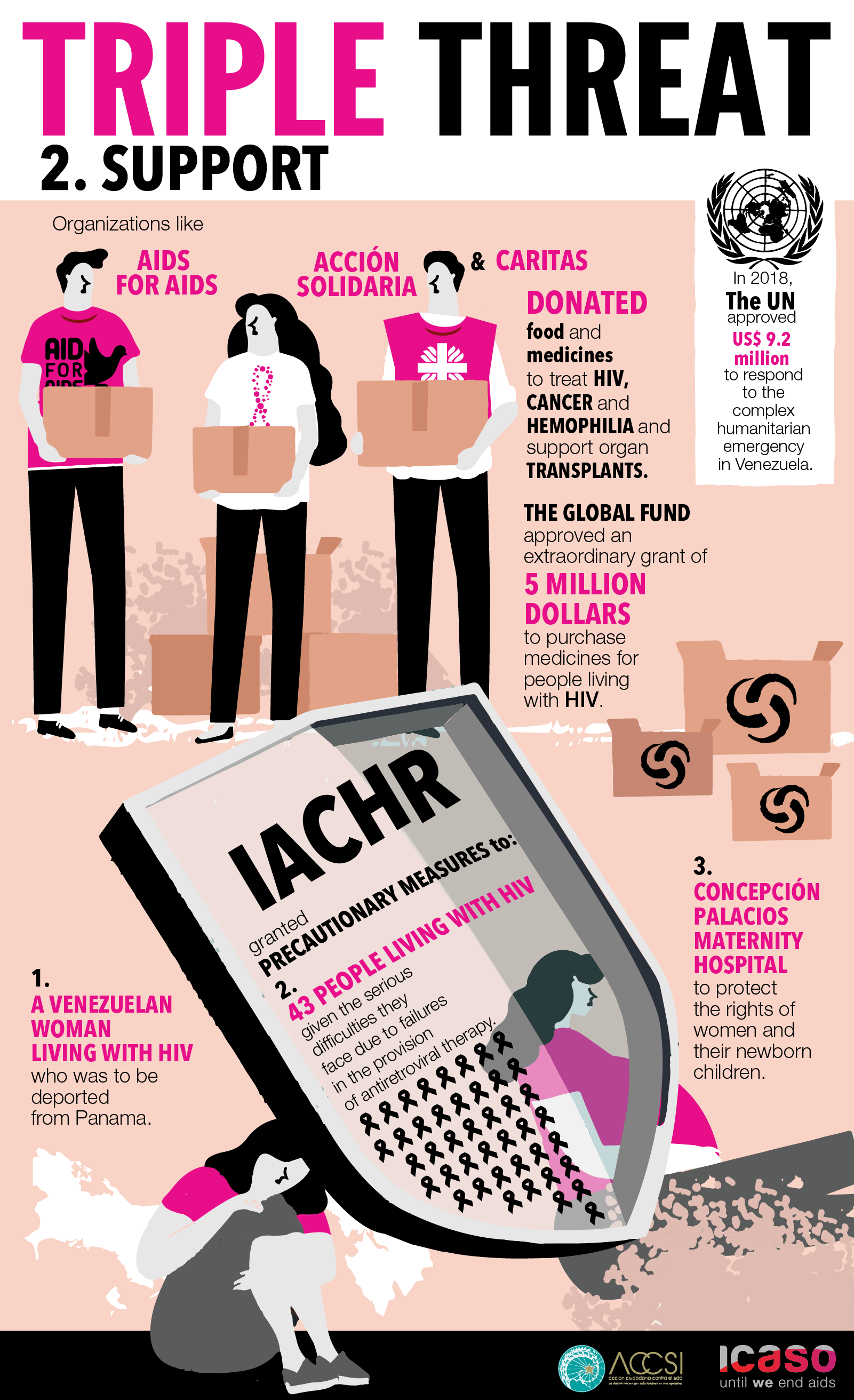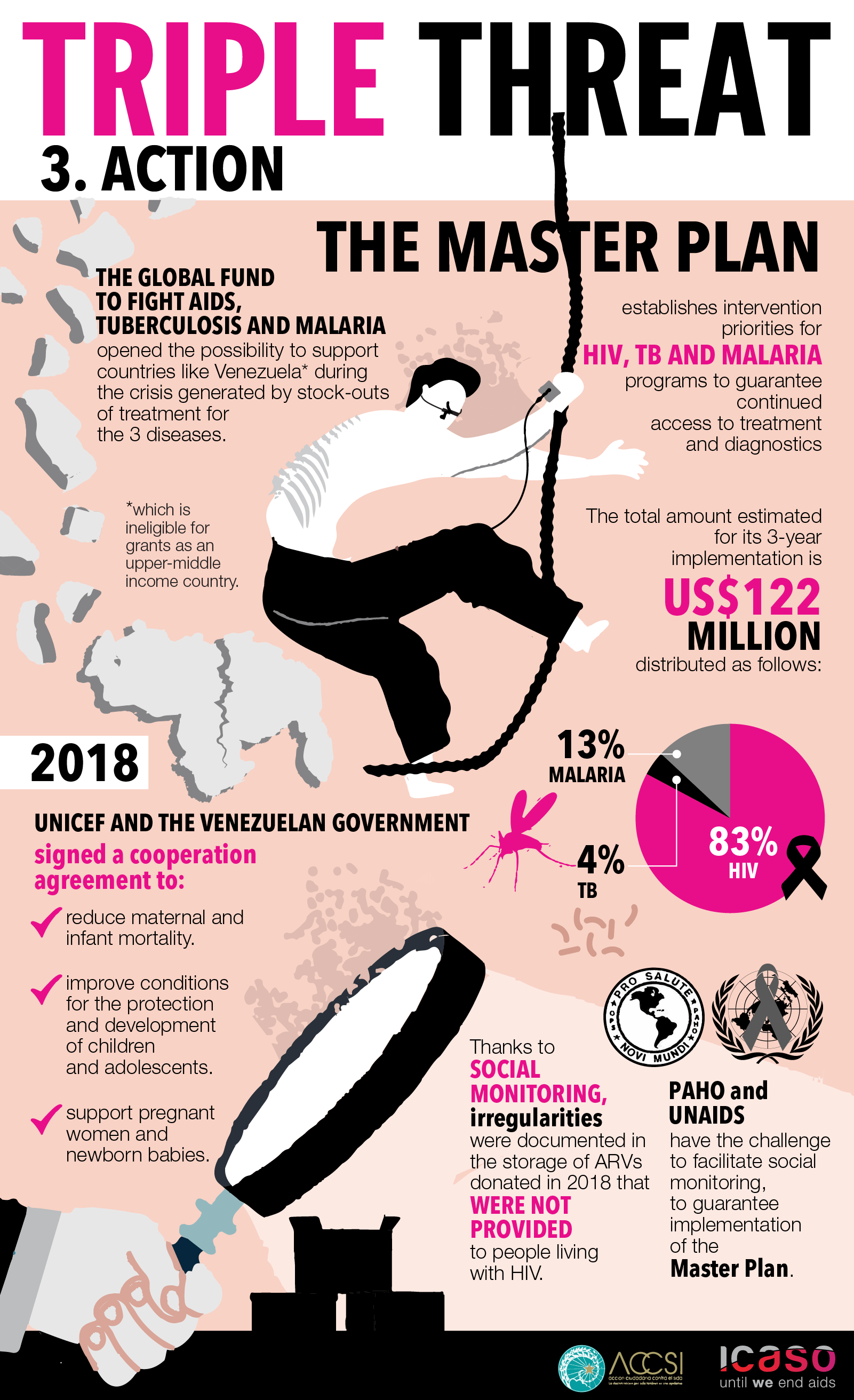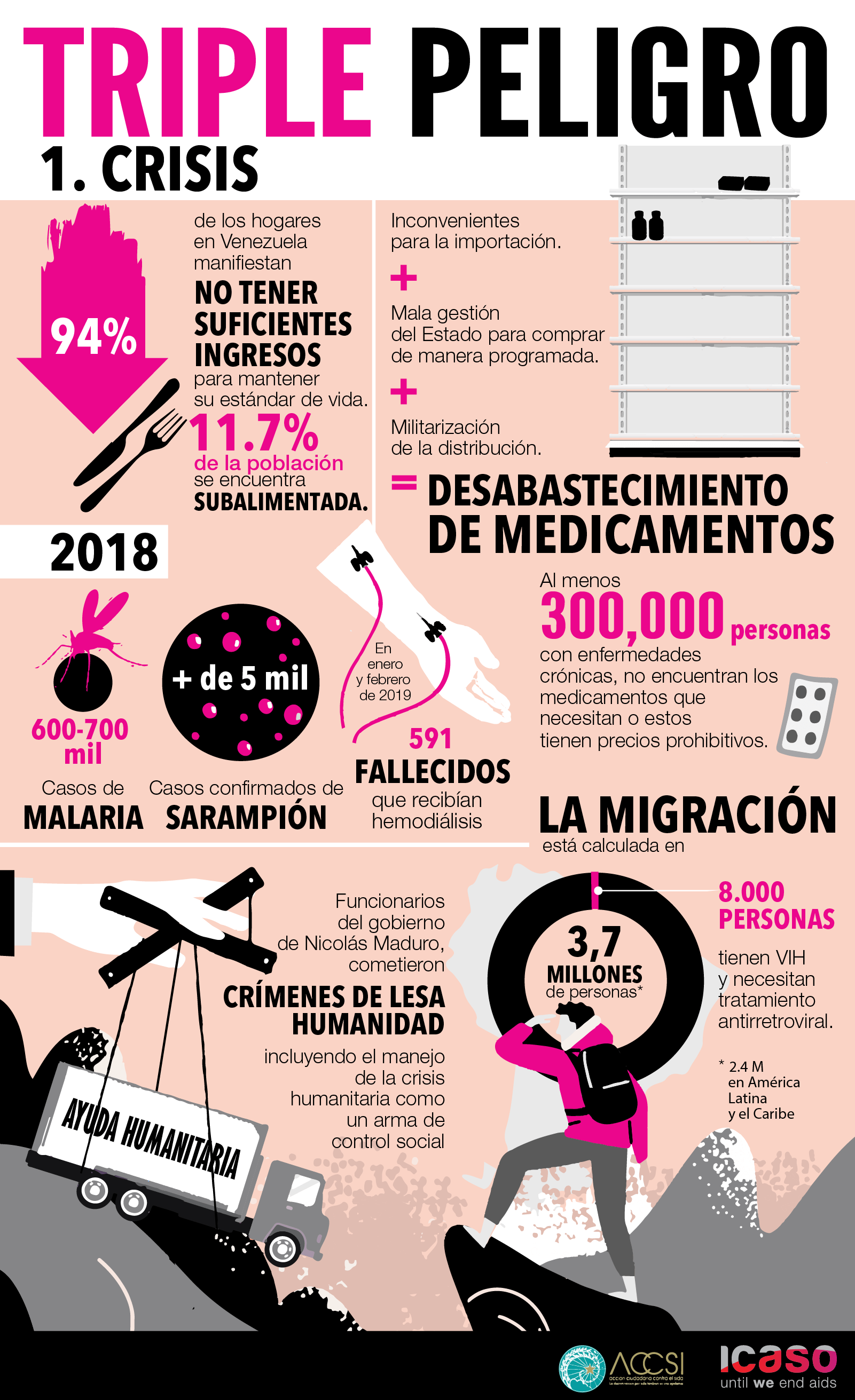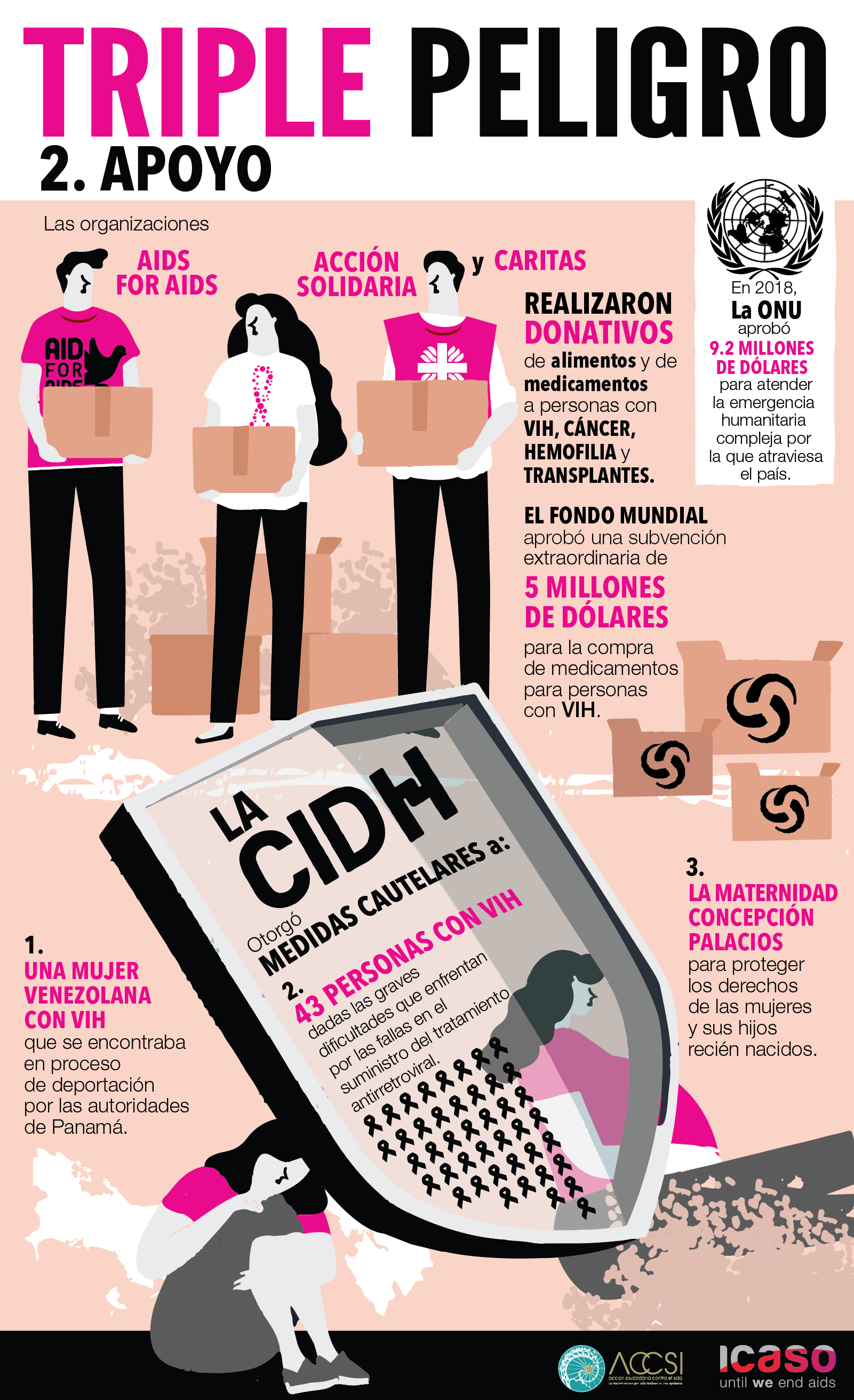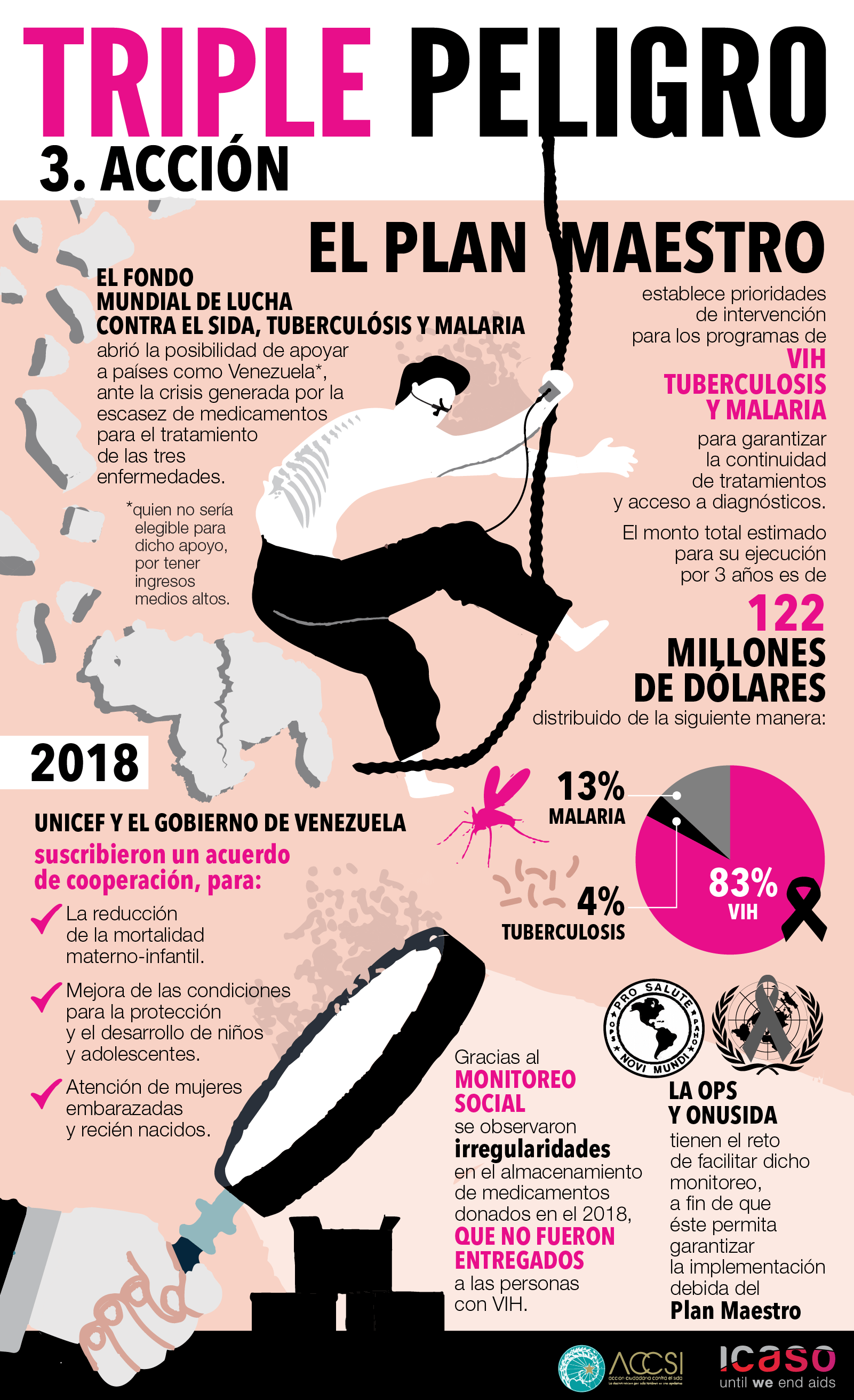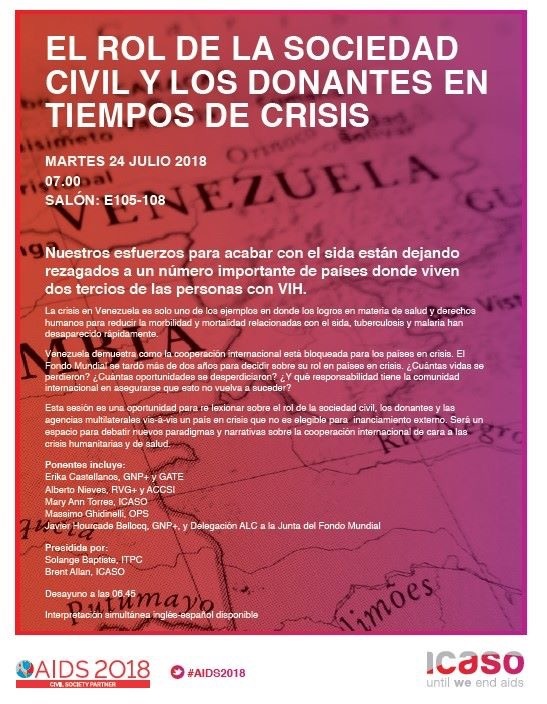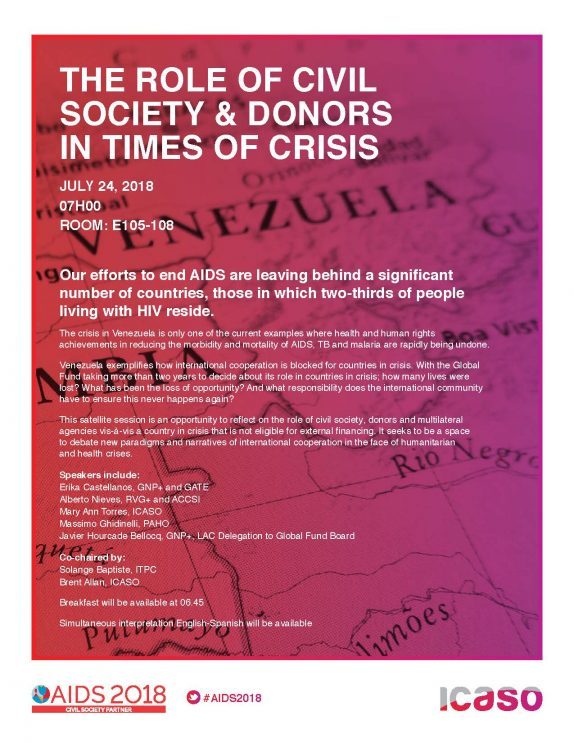Venezuela
- Home
- Venezuela
Letter to UNAIDS: Azul Positivo
ICASO, in partnership with diverse Venezuelan HIV and AIDS NGOs preferring anonymity for fear of retaliation, urge the Joint United Nations Programme on HIV and AIDS (UNAIDS) to take a public stand for the immediate release of the five staff members of Azul Positivo (Acción Zuliana por la Vida) after military counter-intelligence officers arbitrarily detained them. Azul Positivo is an AIDS NGO working to improve the lives of thousands of Venezuelans abandoned by the government.
ACCESO A LOS ARV SIN FRONTERAS – MIGRAR ES UN DERECHO HUMANO
THE GLOBAL FUND AND CIVIL SOCIETY ORGANIZATIONS SAVE THE LIVES OF 40.000 VENEZUELANS
Venezuela was not eligible for the Global Fund funding because it was a high-income country with a low disease burden. However, the Global Fund Board made an exception and donated resources to support the people of Venezuela. With a modest and intelligent investment– and in partnership with civil society– the Global Fund is saving the lives of over 40.000 people living with HIV in Venezuela
EL FONDO MUNDIAL Y LAS ORGANIZACIONES DE LA SOCIEDAD CIVIL SALVAN LA VIDA DE 40.000 personas en venezuela
Venezuela no era elegible para recibir financiamiento del Fondo Mundial porque es un país de ingresos altos con una carga de enfermedades baja. Sin embargo, la Junta Directiva del Fondo Mundial hizo una excepción y donó recursos para apoyar al pueblo de Venezuela. Con una inversión modesta e inteligente, y en asociación con la sociedad civil, el Fondo Mundial está salvando la vida de más de 40.000 personas que viven con VIH en Venezuela
Resiliencia de los sistemas de la sociedad civil durante una emergencia humanitaria — sesión satélite en AIDS2020Virtual
La sesión se enfoca en el importante papel que juega las organizaciones de la sociedad civil y las redes de personas que viven con VIH en mantener los servicios de salud y VIH activos durante la emergencia humanitaria en Venezuela y al mismo tiempo en monitorear la asistencia internacional que llega al país.
Venezuela ha vivido una emergencia humanitaria por más de una década, con el colapso completo de sus sistemas de salud. Con la respuesta gubernamental al VIH severamente debilitada, las organizaciones de la sociedad civil nacionales y sus aliados internacionales han llenado este vacío. Los tres elementos de sus agendas son la prestación de servicios liderados por la comunidad, el monitoreo y vigilancia del sistema de salud, y la incidencia política.
Resilience of civil society systems during a humanitarian emergency
The session focuses on the important role civil society organizations and networks of people living with HIV play in keeping HIV and health related services active during the humanitarian crisis in Venezuela, as well as monitoring international and local assistance that arrives to the country.
Venezuela has been experiencing a humanitarian crisis for more than a decade, with a complete collapse of its health system. With the national government’s response to HIV so severely weakened, Venezuelan civil society organizations and international allies have stepped in to fill the void. The three prongs of their agenda have been community-led service delivery, health system monitoring and “watchdogging”, and advocacy.
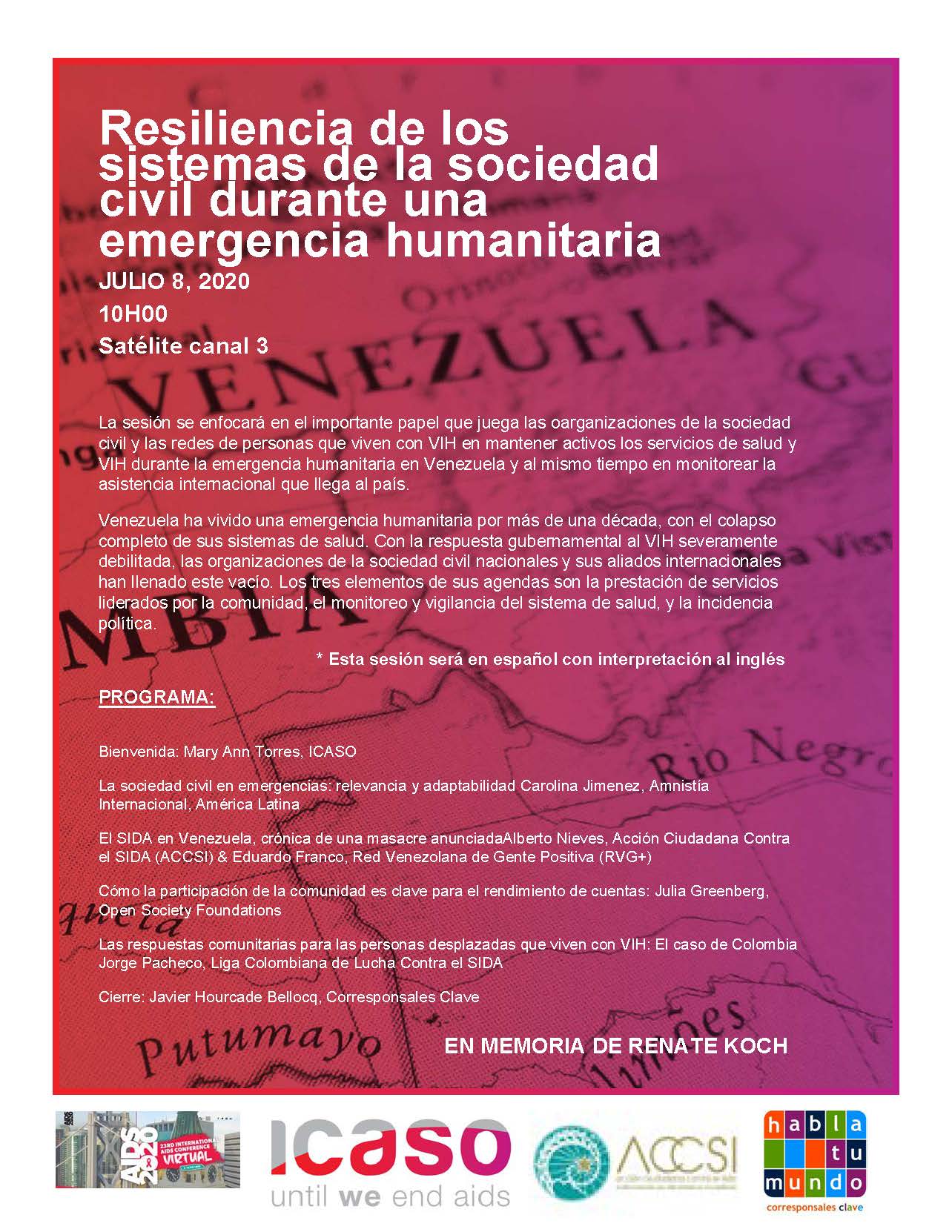
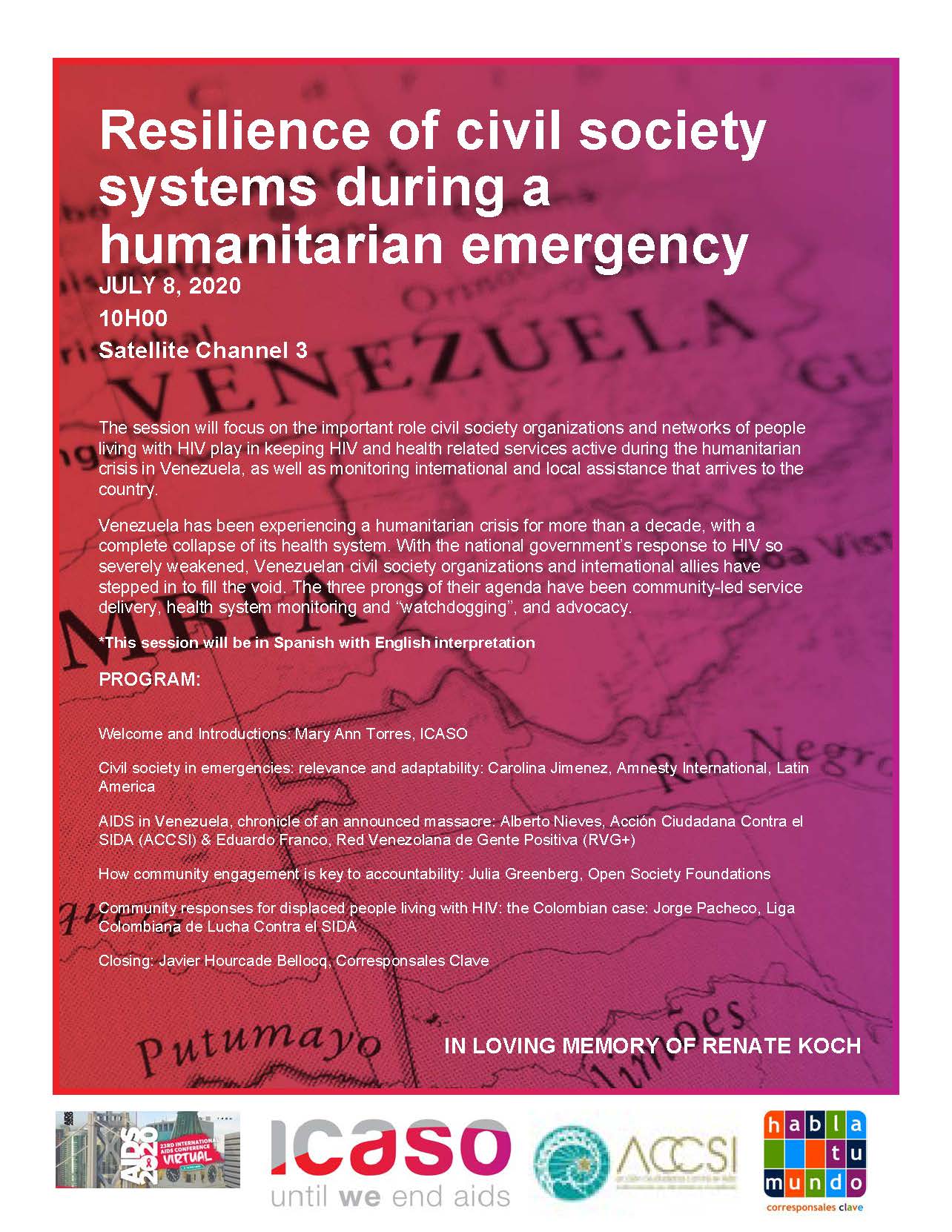
Global Fund Allocates $19.8 Million to Fight Malaria Crisis in Venezuela
27 January 2020 (Toronto, CANADA and Caracas, VENEZUELA) – On 16 January 2020, the Global Fund sent a letter to the Ministry of Health, communicating that Venezuela has been allocated $19.8 million for a three-year malaria grant.
This is the first time that Venezuela has been allocated Global Fund resources for malaria. The allocation follows a May 2019 decision by the Global Fund’s Board, which made the upper middle-income country exceptionally eligible for malaria funding.1 The exception is due to the significant upsurge in malaria cases in the country, the potential for the outbreak to deteriorate further with continuing high numbers of cases in 2019, the impact that it is having on the region, and the lack of national capacity to respond to the upsurge.
Click here to read/download the document :
Malaria Briefs
By Leopoldo Villegas and Mary Ann Torres
HIGHLIGHTS
In the 1960s, Venezuela was the first country in the world that eliminated malaria in 70% of its territory. This achievement helped reshape the public health landscape of the country.
The malaria morbidity and mortality rates are staggering. Between 2000 and 2018, there were 1.97 million cases reported – a 1260% increase, from 29,736 cases in 2000 to 404,924 in 2018. By June 2019, most federal entities in the country were reporting local malaria transmission. The situation is worsening with time, as several malaria-free areas have been reporting the re-introduction of the disease.
Click here to read/download the document :
.
Report of the United Nations High Commissioner for Human Rights on the situation of Human rights in the Bolivarian Republic of Venezuela
The present report focuses on the situation of human rights in Venezuela since 2018, while also analysing pertinent developments that took place beforehand. It highlights patterns of violations directly and indirectly affecting all human rights – civil, political, economic, social and cultural. The report includes a gender-based approach, highlighting the specific experiences of women and girls.
Statement by Venezuelan civil society organizations in relation to the Situation Report on the UN humanitarian scaling-up in Venezuela
In relation to the recent publication of the first Situation Report on Humanitarian Scaling-up in Venezuela prepared by the United Nations, the undersigned organizations and individuals wish to express the following:
THE UNITED NATIONS IS INCOHERENT WITH THE REALITY OF HIV IN VENEZUELA
The Venezuelan Network of Positive People (RVG+) and the Coalition of NGOs of the Interior of the Country (COVIP) express their deep concern and total rejection with regard to the information offered by the Office of the Resident Coordinator in Venezuela in conjunction with the Office for the Coordination of United Nations Humanitarian Affairs (OCHA) and the Intersectoral Coordination Group UNETE, in their report covering January to April 2019, published on May 15, 2019, where they state that:
“10 million treatments were distributed to treat HIV, which ensured treatment of 50,000 people for three months in the 24 states, in collaboration with PAHO/WHO, UNAIDS, the Minister of Health (MPPS) and civil society organizations”.
Triple Threat Update
In this new update, ICASO and ACCSI work together again to highlight the most important milestones that took place in Venezuela throughout 2018 and the beginning of 2019 with respect to HIV, malaria and tuberculosis in the context of the complex humanitarian emergency there.

 Persecution of activists in Venezuela
Persecution of activists in Venezuela
El Consejo Internacional de Organizaciones con Servicio en SIDA (ICASO) y la Red Global de Personas que viven con VIH (GNP+) denuncian a la opinión pública internacional el escalamiento de las amenazas, persecuciones y detenciones de los defensores de derechos humanos y activistas con VIH en Venezuela, situación que amenaza la integridad física y libertad que impide realizar sus trabajos a favor de las personas con VIH de ese país.
Carta a las autoridades de salud de Venezuela para que cumplan con sus compromisos con las personas que viven con VIH
Dr. Carlos Alvarado- Ministro del Poder Popular para la Salud (MPPS)
Dra. Marisela Bermudez- Viceministra de Salud de Redes Colectivas
Dr. Raúl Leonett C. -Director del Programa Nacional de SIDA
El 4 de febrero del presente año, varias organizaciones de la sociedad civil con trabajo en VIH escribieron una carta pública al ministro Carlos Alvarado exigiendo la liberación y entrega inmediata de antirretrovirales para personas con VIH en Venezuela. La presente es para hacerle seguimiento a dicha carta y para denunciar de manera pública y responsable la existencia en el Almacén Jipana de miles de cajas de tratamientos antirretrovirales de distintos tipos y marcas, donados por la comunidad internacional en 2018 y 2019. Todos los medicamentos retenidos en el Almacén Jipana deben ser entregados de inmediato a las más de 70.000 personas que viven con VIH en el país, incluyendo niñas y niños.
[Para la versión en español haga click aquí ]
ACTUALIZACIÓN DE TRIPLE PELIGRO
En esta nueva entrega de Triple Peligro ICASO y ACCSI vuelven a trabajar conjuntamente para resaltar los hitos más importantes ocurridos a lo largo del año 2018 y principio de 2019 en materia de VIH, malaria y tuberculosis en
Venezuela en el contexto de la emergencia humanitaria compleja que allí se vive.
[Para la versión en español haga click aquí ]
TRATAMIENTO ANTIRRETROVIRAL PARA
PERSONAS CON VIH GUÍA PRÁCTICA
El Programa Nacional de VIH/Sida adscrito al Viceministerio de Redes de Salud Colectiva del Ministerio del Poder Popular para la Salud, expone al alcance del equipo de salud, la presente Guía Práctica de Tratamiento Antirretroviral para Personas con VIH.
Esta Guía contempla las nuevas recomendaciones de la OMS sobre el uso de antirretrovirales para el tratamiento del VIH (2018) con nuevos esquemas terapéuticos en primera y segunda línea y facilita una transición sin complicaciones a tratamientos antirretrovirales optimizados. Además, recomienda adoptar esquemas terapéuticos con ARV de gran potencia, barrera genética alta frente al desarrollo de farmacorresistencia del VIH (FRVIH), toxicidad baja y costo reducido
Pronouncement of Venezuelan Network of Positive People, RVG+ (Red Venezolana de Gente Positiva)
We demand cessation of criminalization, persecution, abuse and threats against members of the MAVID Foundation, our network and people with HIV in Venezuela
The Venezuelan Network of Positive People (RVG+) denounces acts of criminalization, threats, psychological aggression, intimidation and persecution towards MAVID Foundation (Manos Amigas por la Vida), members of our network and civil society organizations working in the HIV field.
On Friday, February 15th 2019, in the city of Valencia in the state of Carabobo, the headquarters of the MAVID Foundation was the subject of an abusive and arbitrary raid by state security forces, identified as members of the Scientific, Penal and Criminal Investigation Service Corps (CICPC – Cuerpo de Investigaciones Científicas, Penales y Criminalísticas).
BREAKING NEWS : HIV service agency in Venezuela stormed by police, lifesaving HIV treatments confiscated
The police have stormed the offices of Fundación Mavid, a HIV service organization in Venezuela, and confiscated donated HIV treatment, infant formula and other essential medicines destined for people living with HIV in that country. They have also detained 3 human rights advocates that worked in Mavid. No charges have yet been laid. “We are scared for the safety of our activists and call upon the global community to help us – not just us, but the people of Venezuela living with HIV” says Alberto Nieves, Executive Director of Acción Ciudadana Contra el SIDA (ACCSI).
Click here to read/download the document :
NGO demand a coherent and attach to human rights action from the UN in the response of the humanitarian emergency in Venezuela
In light of the recent participation of representatives of the United Nations (UN) present in Venezuela in acts related to the political situation, on January 10 and 12, 2019, and aiming at the generation of conditions conducive to the urgent and necessary access to plans and mechanisms of international humanitarian assistance and cooperation in the dimensions and scope required to guarantee the protection of human rights of the Venezuelan population, in a credible, coherent, effective and transparent manner, the undersigned civil society organizations publicly state:
Click here to read/download the document :
Triple Threat Bulletin
THE HEALTH CRISIS IN VENEZUELA
The humanitarian crisis in Venezuela was created and it is encouraged by the government. The government’s refusal to publish epidemiological data and to censor and even discipline those who have attempted to do it has put millions of lives at risk. In the government’s mind, the “absence” of data translate into the absence of a crisis. Their refusal to accept any foreign “aid” has been also widely documented (IACHR, 2018). However, the National Assembly has declared the humanitarian and food emergency at least 3 times in the last 2 years (National Assembly, 2017).
Special issue: Analysis of the World Malaria Report 2018 by the Venezuelan Society for Public Health (Sociedad Venezolana de Salud Pública)
“The 2018 World Malaria Report raises alarm bells because for the second consecutive year, the reduction of the global malaria epidemic is stagnant”
“Venezuela is now #9 within the 20 countries with highest disease burden, and the only one outside the African continent and India. Venezuela had 84% increase in cases, compared to 2016.
“it is deplorable that the country profile for Venezuela is not available”
The analysis – in Spanish – is available here
GLOBAL FUND APPROVES FUNDING TO ADDRESS THE HEALTH CRISIS IN VENEZUELA
The Global Fund Board approved a motion which will allow the Secretariat to provide up to $US 5 million funding to respond to the health crisis in Venezuela. The decision is the culmination of a concerted and unyielding effort by Venezuelan and global activists to push the Global Fund to show leadership in supporting countries in crisis.
EL FONDO MUNDIAL APRUEBA FINANCIAMIENTO PARA RESPONDER A LA CRISIS DE SALUD EN VENEZUELA
La Junta Directiva del Fondo Mundial aprobó una moción que le permitirá a la Secretaría proporcionar hasta 5 millones de dólares de financiamiento para responder a la crisis de salud en Venezuela. La decisión es la culminación de un esfuerzo concertado y sólido de los activistas venezolanos y globales dirigidos a presionar al Fondo Mundial para que demuestre liderazgo en el apoyo a los países en crisis.
Open letter to the Government Representatives of the Member States of the Pan American Health Organization (PAHO) attending the 56th Directing Council of PAHO, key international and national partners, non-governmental organizations and the general interested publicdemanding the creation of a Multisectoral Technical Working Group with key partners that can develop—as a matter of urgency—anEmergency Response Plan for the country. This plan must have among its objectives to mitigate the social and health consequences, the ailments and deaths—already imminent—by the magnitude and complexity of the emergency and include activities that reach the countries of the region that are affected.
Carta abierta a los Representantes de los Gobiernos de los Estados Miembros de la Organización Panamericana de la Salud asistentes al 56° Consejo Directivo de la OPS, asociados claves internacionales y nacionales, organizaciones no gubernamentales y público en generalsolicitando la creación de un Grupo Técnico de Trabajo Multisectorial con asociados clave (nacionales e internacionales) que pueda desarrollar -con carácter de urgencia- un Plan de Respuesta de Emergencia para el país. Este plan debe tener entre sus objetivos mitigar las consecuencias sociales y sanitarias, los padecimientos y muertes -ya inminentes- por la magnitud y complejidad de la emergencia e incluir actividades que alcancen a los países de la región que son afectados.


